Unlock the secrets of NSF Certified water filter with PureFlowz comprehensive guide. Are you concerned
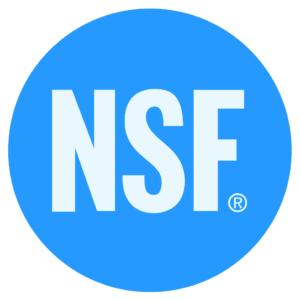
about the safety of your drinking water? Do you know what NSF Certification means and why it’s crucial for your water filter? This article delves deep into the importance of NSF Certification, explaining key standards like NSF 42, 53, 401, and P231, and how they impact your health. Learn how federal regulations like the Safe Drinking Water Act and the role of the EPA complement these standards. We also guide you on how to verify if a water filter is genuinely NSF certified and what red flags to watch out for.
Introduction
In the water filtration industry, NSF certification stands as a hallmark of quality and reliability. For businesses in this sector, understanding the intricacies of NSF Certification is not just beneficial—it’s imperative. This certification serves as a key differentiator in a market saturated with products that claim to offer the best in water purification.
This comprehensive guide aims to demystify NSF Certification, providing you with the insights needed to make informed procurement decisions for your business
Demystifying NSF Certifications
When it comes to water filtration, one acronym stands out as the gold standard: NSF. NSF International is an independent, accredited organization that develops public health standards and certification programs to protect the world’s food, water, consumer products, and environment. But what does it mean for a water filtration system to be NSF certified? And why should you care? Let’s dive deep into the world of NSF certifications to answer these questions.
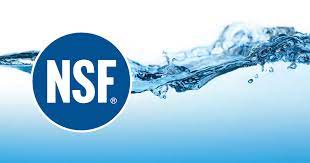
What is NSF International?
Founded in 1944, NSF International’s mission is to protect and improve global human health. Manufacturers, regulators, and consumers look to NSF to develop public health standards and certifications that help protect food, water, consumer products, and the environment. NSF is responsible for developing over 80 American National Standards under the scope of public health, safety, environment, and sustainability assessment.
The Importance of NSF Certifications
NSF certifications are not just badges or stickers that companies slap onto their products. They are marks of quality, safety, and efficiency. When you see an NSF certification on a water filter or any other product, it means that the product has undergone rigorous testing and meets the stringent standards set by NSF International. This is crucial because water is a vital resource that directly impacts our health. Contaminated water can lead to a host of health issues, including gastrointestinal illness, reproductive problems, and neurological disorders. Therefore, ensuring that your water filtration system is NSF certified is not just a matter of better taste or odor; it’s a matter of public health and safety.
Understanding Key NSF Standards(NSF certified water filter)
NSF has a range of standards that apply to water filtration systems, each designed to address different
aspects of water quality. Here are some of the most important ones:
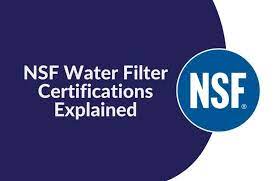
- NSF Standard 42: This standard focuses on aesthetic effects, such as reducing chlorine, taste, and odor in your drinking water. It’s the most basic level of certification and is often found in simple activated carbon filters.
- NSF Standard 53: This is a more advanced standard that targets specific health-related contaminants like lead, volatile organic chemicals (VOCs), and Cryptosporidium. If you’re concerned about the safety of your drinking water, look for filters certified to this standard.
- NSF Standard 58: This standard is specific to reverse osmosis systems and addresses contaminants that can be removed through this technology, such as hexavalent chromium, arsenic, and nitrates.
- NSF Standard 401: This is an emerging standard that focuses on incidental contaminants like pharmaceuticals, over-the-counter medications, and certain herbicides and pesticides.
Each of these standards involves a series of rigorous tests that a product must pass to earn certification. For example, to meet NSF Standard 53, a water filter must be able to reduce lead levels to below 15 parts per billion, which is the U.S. Environmental Protection Agency’s action level for lead in drinking water.
Why Trust NSF?
The credibility of NSF comes from its rigorous testing procedures and its independence. NSF laboratories are accredited by the Occupational Safety and Health Administration (OSHA), the Standards Council of Canada (SCC), the American National Standards Institute (ANSI), and several other international accreditation bodies. This means that when NSF certifies a product, multiple layers of oversight ensure the certification’s validity.
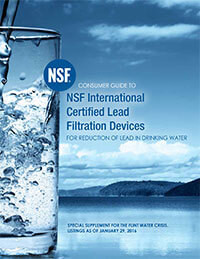
In conclusion, NSF certifications offer a reliable way to ensure that a water filtration system meets high standards for quality and safety. By understanding the different NSF standards and what they mean, you can make a more informed decision when purchasing a water filtration system. Whether you’re a homeowner looking to provide safe drinking water for your family, or a business owner like Sudeep who values quality and reliability, NSF certifications offer peace of mind that you’re making a wise investment in your health and well-being.
Absolutely, a professionally crafted section with evidence and references can significantly bolster the article’s credibility. Here’s an extended version of “Section 3: Understanding IAPMO Certifications,” aiming for 150-200 words while incorporating professional elements.
Understanding IAPMO Certification
While NSF certifications are often the most talked-about in the water filtration industry, IAPMO (International Association of Plumbing and Mechanical Officials) plays an equally vital role. Established in 1926, IAPMO specializes in developing codes and standards for the safe and efficient use of plumbing and mechanical systems. Their certifications are particularly relevant for complex water filtration systems that incorporate intricate plumbing setups.
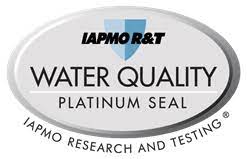
IAPMO certifications are not just an afterthought; they are a necessity for ensuring the highest standards of safety and performance. For instance, IAPMO’s Uniform Plumbing Code (UPC) is recognized as an American National Standard and has been adopted by jurisdictions worldwide. This code sets the groundwork for the design and installation of plumbing systems, including water filtration units. Compliance with UPC ensures that a product is not just effective but also safe for long-term use.
Moreover, IAPMO offers the Water Efficiency and Sanitation Standard (WE•Stand), which focuses on water conservation and sanitation. Products certified under this standard not only promise efficiency but also contribute to sustainable water management.
How to Verify Certifications
How can you be certain that the water filtration solutions you’re considering are genuinely NSF certified? Verifying NSF Certification is a critical step in ensuring that you’re investing in products that meet industry standards for safety and performance. Here’s a step-by-step guide on how to do it.
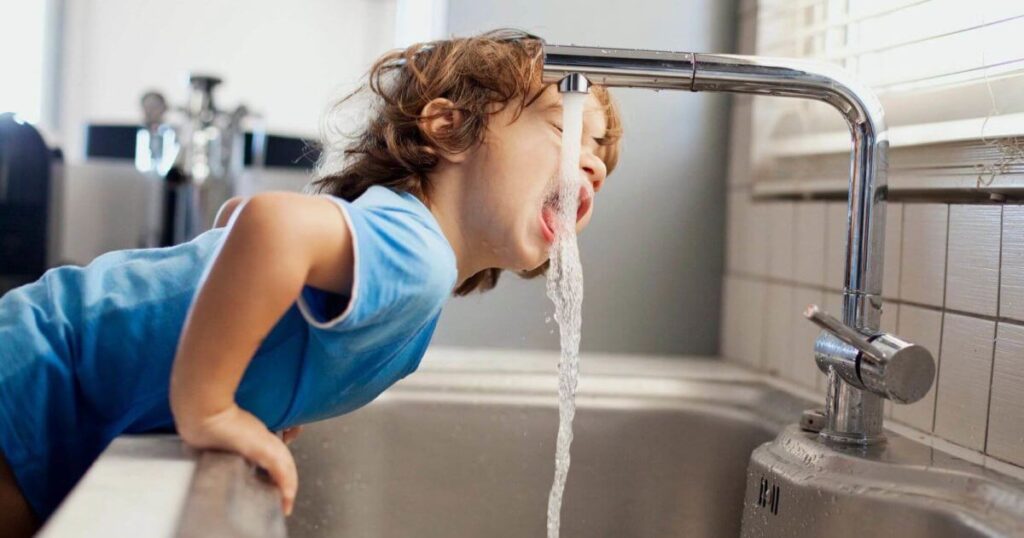
Step 1: Check the Product Label
The first step in verifying NSF Certification is to look for the NSF mark on the product packaging or the product itself. This mark is usually accompanied by the relevant NSF/ANSI Standard numbers, such as 42, 53, 401, or P231.
Step 2: Visit the NSF Website
Go to the official NSF International website to cross-verify the certification. Navigate to their Product and Service Listings page.
Step 3: Use the Search Function
On the NSF Product and Service Listings page, use the search function to look for the product or company you’re interested in. You can search by product type, company name, or the specific NSF/ANSI Standard.
Step 4: Review the Certification Details
Once you find the product or company, click on the listing to view the certification details. This will include the specific contaminants the product is certified to reduce, as well as any additional certifications it may hold.
Step 5: Check the Certification Date
Ensure that the certification is current and has not expired. NSF certifications are generally valid for a specific period and need to be renewed.
Step 6: Contact NSF if Needed
If you have any doubts or questions, don’t hesitate to contact NSF International directly for clarification. They can be reached via email or phone, as listed on their Contact Us page.
Verifying NSF Certification is an important due diligence step for businesses in the water filtration industry. It provides a level of assurance regarding product quality and safety. However, it’s worth noting that NSF Certification is one of several factors to consider when making procurement decisions. Other factors such as technological advancements, customer service, and overall product performance should also be evaluated.
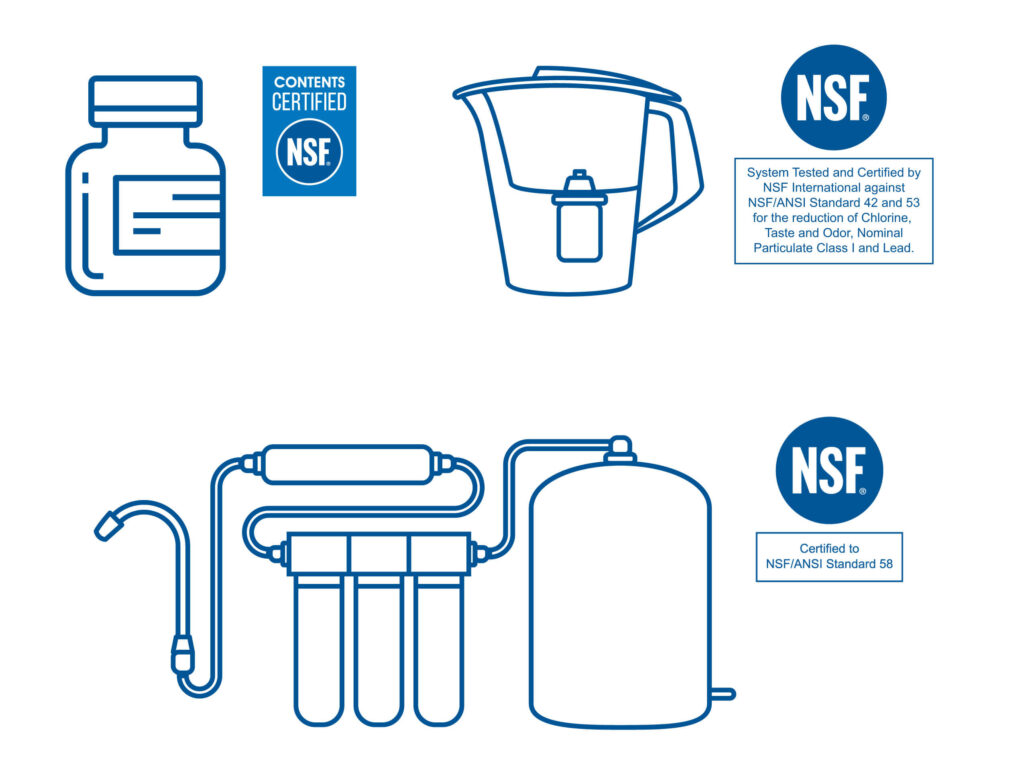
By following the steps outlined in this section, you can effectively verify NSF Certification, adding another layer of confidence to your procurement process, without limiting your options.
EPA Water Quality Standards
In the realm of water filtration, understanding federal regulations is as crucial as knowing industry-specific standards like NSF Certification. Two key players in this context are the Safe Drinking Water Act (SDWA) and the Environmental Protection Agency (EPA). This section aims to provide businesses in the water filtration industry with a comprehensive overview of these federal regulations and their impact on water quality standards.
The Safe Drinking Water Act (SDWA)
Enacted in 1974, the Safe Drinking Water Act serves as the cornerstone of water quality regulation in the United States. The SDWA authorizes the EPA to set national health-based standards to protect against both naturally occurring and man-made contaminants that may be found in drinking water.
Key Provisions of the SDWA:
- Maximum Contaminant Levels (MCLs): The EPA sets MCLs for various contaminants, which all public water systems must comply with.
- State Involvement: States can assume the responsibility for water regulation within their jurisdiction if they meet certain criteria set by the EPA.
- Public Right to Know: The SDWA mandates that consumers be informed about the source and quality of their drinking water.
The Role of the Environmental Protection Agency (EPA)
The EPA is the federal agency responsible for administering the SDWA and setting water quality standards. Their role extends beyond just setting MCLs; they are also involved in:
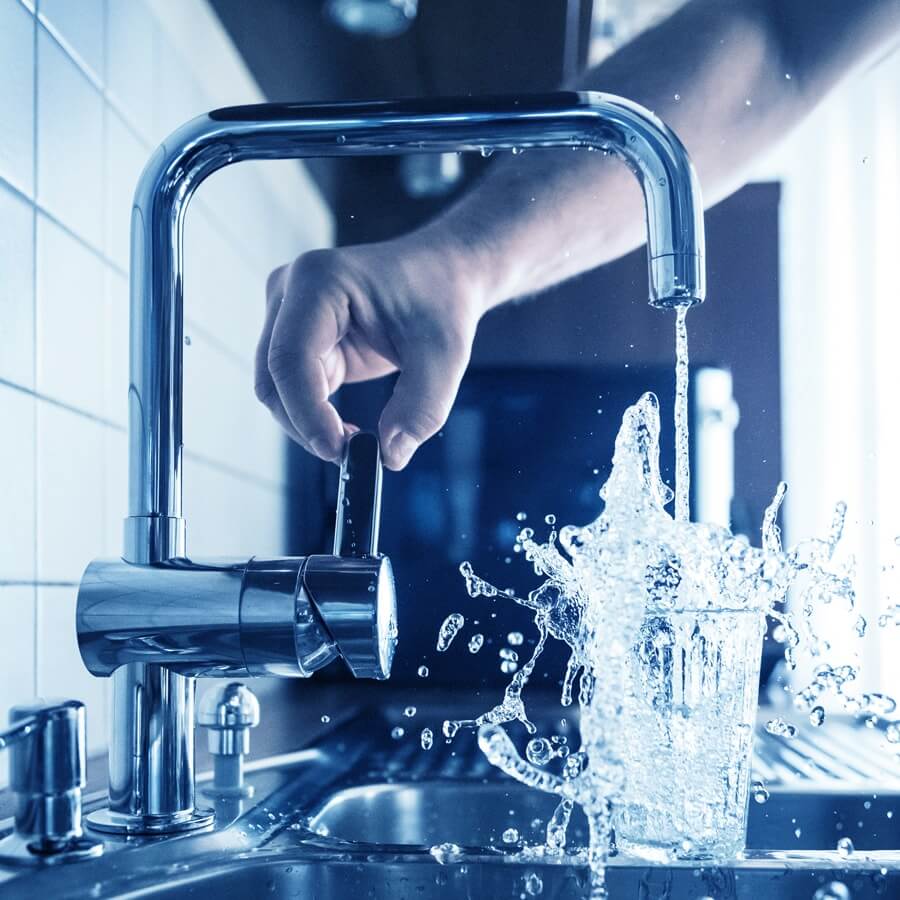
- Research and Risk Assessment: The EPA conducts research to understand the long-term effects of various contaminants on human health.
- Enforcement: The agency has the authority to enforce penalties for non-compliance with water quality standards.
- Public Outreach: The EPA provides educational resources to help both consumers and businesses understand the importance of water quality.
Relevance to the Water Filtration Industry
For businesses in the water filtration industry, understanding the SDWA and the EPA’s role can offer several advantages:
- Compliance: Being aware of federal regulations helps businesses ensure that their products are compliant, thereby reducing the risk of legal repercussions.
- Consumer Trust: Demonstrating compliance with not just industry standards but also federal regulations can significantly boost consumer trust.
- Innovation: Understanding the regulatory landscape can guide R&D efforts, helping businesses develop products that meet or exceed both current and future standards.
In summary, the SDWA and the EPA play pivotal roles in shaping water quality standards in the United States. For businesses in the water filtration industry, a deep understanding of these federal regulations is not just beneficial—it’s essential.
Conclusion
We delved into the key NSF Standards that are most relevant for water purifiers, such as NSF/ANSI 42, 53, 401, and P231. Each standard serves a specific purpose, from improving aesthetic qualities like taste and odor to ensuring the reduction of health-related contaminants. Understanding these standards is crucial for businesses that aim to offer products meeting both consumer expectations and regulatory requirements.
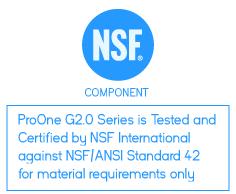
Moreover, we explored the importance of verifying NSF Certification. In a market where claims can be easily made, due diligence in authenticating these certifications cannot be overstated. We provided a step-by-step guide on how to verify NSF Certification, emphasizing the need for businesses to be proactive in this aspect.
However, it’s important to note that while NSF Certification is a valuable indicator, it’s not the be-all and end-all. Other factors such as technological advancements, customer service, and overall product efficacy should also weigh in your decision-making process.
Whether you’re considering NSF-certified water filters or exploring other avenues, the key takeaway is to conduct thorough research and due diligence. Only then can you make an informed decision that aligns with both your business objectives and customer needs.
By equipping yourself with this knowledge, you are better positioned to navigate the complexities of the water filtration market, making choices that are not just compliant but also aligned with your broader business goals.
This article serves as a starting point, and we encourage you to continue your research to make the most informed decisions for your business.
